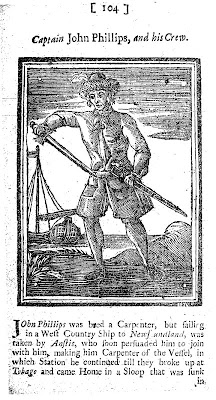John Phillips, who for all intents and purposes was nothing more than a two-bit crook, is remembered in the annals of piracy because of two distinctions. First, Phillips’ Ship’s Articles have come down to us in tact and include a curious and otherwise unheard of passage regarding “prudent” women. Second, Phillips is given space in A General History of Pyrates by Charles Johnson (aka Daniel Defoe), one of the foremost sources of information pertaining to pirates of the Golden Age. Beyond that, Phillips seems to have been a man who started out with a relatively level head, but lost his equilibrium along the way turning into a murderous, vengeful individual who was mad at the whole wide world.
Probably born in Devonshire, England some time in the late 17th century, John Phillips took up the trade of carpentry. It was as a carpenter’s mate that Phillips was traveling from England to Newfoundland when his ship was overtaken and boarded by the pirate Thomas Anstis. As so often happened during that era, Anstis’ ship was without a carpenter and Phillips was pressed, very much against his will it seems, into joining the pirate crew.
Not long after this incident, Anstis had his ship at Tobago in early 1723. After finishing a careening, many of Anstis’ men – including Phillips – were still ashore when Royal Navy ships came into view. In a hurry to save his own skin, Anstis packed on all sail and left the men ashore to fend for themselves. Phillips and a few others escaped into the jungle but the British ships captured many of Anstis’ men. Anstis himself would later be killed by his own crew for his cowardly act; Phillips, however, made it back to England somehow.
According to Johnson, Phillips got word almost immediately that his mates from Anstis’ ship were to be tried for piracy. Fearing his name would come up in the proceedings, he quickly took up a post on another ship bound for Newfoundland. Unable to find work as a carpenter in the New World, he went to work gutting fish among the numerous fisheries on the coast. This job was brutally hard, paid very little and in the dark and cold of the Newfoundland winters, literally drove men and women mad.
Within four month, Phillips was fed up with the fisheries. He and four other like-minded mates stole a boat belonging to a man name Minot or Minors in August of 1723. Their intention was to go a-pirating and they made quick work of a few local fishing vessels, pressing some of the men aboard them into signing their hastily drawn up Ship’s Articles. Though his articles generally follow the pattern of the few others that have come down to us, Phillips included a passage in same that read:
If at any time you meet with a prudent Woman, any Man that offers to meddle with her, without her Consent, shall suffer present Death.
At least two modern writers have speculated that Phillips was witness to brutal incidences of rape while aboard Anstis’ vessel and had no stomach for such barbarism. This is a curious speculation given Phillips’ later dealings not only with prisoners but with his own crew. Of course murder is not rape but rape is torture; to my mind the theory remains only speculative.
At some point, Phillips took John Rose Archer, who claimed to have sailed with Blackbeard, aboard his ship and promoted him to quartermaster. The caused ill will among Phillips’ original four shipmates and that would bubble over in a short time.
Phillips headed south to Tobago where he and his crew suffered three months of near starvation without a single prize. Finally their luck changed; they captured a French merchant and took her over, renaming her Revenge. Other prizes followed, but trouble was brewing. Some of Phillips’ crew, many of them men forced to serve aboard Revenge, began trying to escape. Many were flogged for their trouble and at least one, carpenter Thomas Fern, was shot dead probably by Phillips himself.
By late 1723, Phillips had returned to the waters off Newfoundland where he gutted the local fishing boats almost as soon as they hit the water. One was notably spared because it belonged to the same man from whom Phillips had stolen his original vessel. “We have done him enough injury already,” he told his crew. After this kindness he turned around and tortured a captain who had foolishly tried to run from Revenge.
The success Phillips had in Newfoundland masked the goings-on aboard his own ship. His punishments of even minor infractions became more heinous and already resentful men turned mutinous. In April of 1724, the Revenges had had enough; they rose up and tossed Phillips overboard to drown in the icy water of Notre Dame Bay.
The lack of leadership, no matter how brutal, made quick work of the men aboard Revenge. Johnson says that the ship was overtaken by the Royal Navy and most of her small crew was hanged including quartermaster Archer.
For all his small success, Phillips life at sea did not seem to sit well with him. Unlike others pressed into pirate service who went on to enjoy their new life, freebooting was a short but arguably not very merry one for the mad carpenter.
Header: Engraving of John Phillips from Johnson’s A General History of Pyrates

Ahoy, Pauline! Clearly this guy had "issues"... Maybe he was "bi-polar" or something, but it sounds to me like he definitely wasn't singing "Yo-ho, a pirate's life for me!" or anything of the sort...
ReplyDeletejust saying.
Oh I agree. It kind of seems like he got drawn into piracy purely against his will but then it became his only choice and he took his hatred of his life out on the people around him.
ReplyDeleteI'm probably over-analyzing that but still...
No, Timmy - but was he singing "California Dreaming"? hahaha :-)
ReplyDeleteGood one, Wally!
ReplyDelete